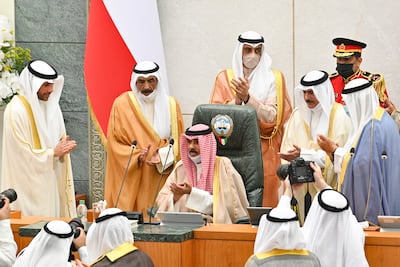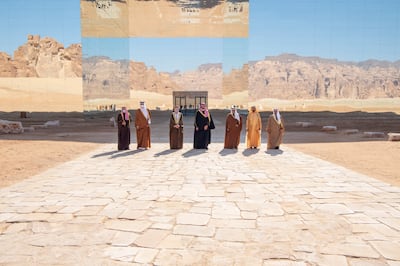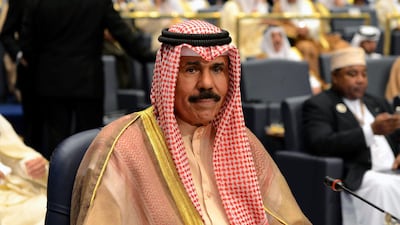The Emir of Kuwait Sheikh Nawaf Al Ahmad Al Sabah has died at the age of 86, the Kuwaiti Royal Court announced on Saturday.
In late November, Sheikh Nawaf was rushed to hospital for an unspecified illness.
The 86-year-old Sheikh Nawaf Al Ahmad Al Sabah had been facing health problems since he was sworn in as Emir in September 2020, following the death of his predecessor, Sheikh Sabah Al Ahmad Al Sabah.
Sheikh Nawaf handed over some constitutional powers to his half-brother and Kuwait's Crown Prince, Sheikh Meshal Al Sabah, two years ago.
Sheikh Meshal, who is 83, is now expected to succeed Sheikh Nawaf as Emir.
Career minister
Sheikh Nawaf was appointed Crown Prince in 2006 by the late Emir Sheikh Sabah. Sheikh Nawaf's nomination to the role had broken decades of Al Sabah tradition, which said the offices of Emir and Crown Prince should alternate between the Al Jaber and Al Salem branches of the ruling family.
Sheikh Sabah's predecessor, the late Sheikh Saad Al Abdullah Al Salem, was Emir only briefly, from January 15 to January 24 2006. He abdicated moments after a vote to remove him from the National Assembly because of ill health.
Sheikh Sabah, who was prime minister at the time, was then voted as Emir by parliament in the midst of the succession crisis and used his new status to consolidate power in the Al Jaber branch, nominating Sheikh Nawaf as Crown Prince and Sheikh Nasser Mohammed Al Ahmad as prime minister.
The appointment of Sheikh Nawaf, from the Al Jaber side of the family, as Emir three years ago meant both the Emir and the Crown Prince nominated by him, Sheikh Meshal, were from the Al Jaber branch.
Sheikh Nawaf was the half-brother of his predecessor, the late Emir Sheikh Sabah, and the sixth son of the 10th Emir of Kuwait, Sheikh Ahmed Al Jaber Al Sabah, who ruled Kuwait from 1921 to 1950.

Sheikh Nawaf was born on June 25, 1937 in the Al Shuyoukh neighbourhood of Kuwait City, now the site of Al Muthanna Complex, and was raised with his brothers and half-brothers at Dasman Palace.
The late Emir held several political and ministerial positions, starting with his work as the governor of Hawalli from 1962 until 1978. During the 16 years that Sheikh Nawaf spent in that role, the village transformed from a tiny coastal village town into a commercial and residential centre marked by modern construction and economic activities, especially during the late 1970s.
He was then appointed Minister of Interior in 1978 and would spend a decade in the role. In 1988, he became minister of defence.

When the first government was formed after the liberation of Kuwait in 1991, Sheikh Nawaf was assigned to the Ministry of Social Affairs and Labour. He then became deputy chief of the National Guard in 1994, before assuming the position of Minister of the Interior again in 2003 until he was nominated as Crown Prince in 2006.
His official biography by the royal court said that he studied in various Kuwaiti schools and that he had married only once, to Sharifa Sulaiman Al Jassim, and had four sons and a daughter. His eldest son, Sheikh Ahmad Al Nawaf, is now Kuwait’s Prime Minister.
During his tenure as Minister of Interior, Sheikh Nawaf participated in many meetings of interior ministers of the Gulf Arab countries, as well as in meetings of Arab interior ministers, and contributed to building security integration in the GCC and Arab world. He was known to have advocated for regional co-operation and unity.

Tenure as Emir
During his tenure as Crown Prince, Sheikh Nawaf supported the efforts of the late Emir Sheikh Sabah as a mediator during the Gulf rift of 2017-2021 when several countries including Saudi Arabia, Bahrain and the UAE cut diplomatic ties with Qatar.
Kuwait, under both then-Emir Sheikh Sabah and then-Crown Prince Sheikh Nawaf played a pivotal role as mediators, often travelling to both countries to mediate a final resolution to the crisis.
Sheikh Nawaf's term has been marked by disagreements between the appointed government and elected parliament which saw Kuwaitis head to the polls three times over the past three years.
Voters in Kuwait cast their ballots for a third time in as many years earlier in June, with the hope of ending prolonged deadlock between the appointed government and elected parliament after the judiciary dissolved the legislature earlier this year.
The latest general election was called by Sheikh Nawaf and his Crown Prince after they dissolved parliament for a second time during the reign due to persistent political deadlock. This saw MPs make several calls for a no-confidence vote against the government of Prime Minister Sheikh Ahmad.
In total under Sheikh Nawaf's reign, Kuwait saw seven government formations in three years due to the ongoing political rift with the National Assembly, primarily over a draft bill calling on the government to take over the consumer and personal loans of Kuwaiti citizens, at an estimated value of several billion dinars.
The government said the move would be too expensive, costing almost $46 billion in public funds, while MPs said it would cost less than $6.5 billion.
Sheikh Nawaf issued an Emiri decree on November 28 that led to a number of prisoners being pardoned, as well as the restoration of citizenship for opposition figures that were revoked about a decade ago.
In total this year, the Emir pardoned at least 37 people, including political figures and members of the ruling family, in a move welcomed by the government at the time as a step towards national reconciliation.
In 2021, Sheikh Nawaf issued a long-awaited amnesty decree, pardoning and reducing the sentences of nearly three dozen Kuwaiti political dissidents.
When he took the oath of office in front of the National Assembly in 2020, the late Sheikh Nawaf called on MPs to reconcile for the sake of national unity, warning that further political feuding would endanger national security.
“National unity has proven to be our strongest weapon in facing challenges, dangers and crises,” said Sheikh Nawaf at the time, calling on the public to adhere to national principles.
“The Kuwaiti people have embodied a close bond with the government and its leaders,” he said.


